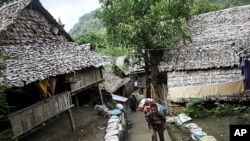The European Commission visited Burmese refugee camps along the Thai-Burma border this week to evaluate a shift in priorities from basic relief services to longer-term sustainable assistance. But as aid workers on the border scramble to cope with the newest wave of ethnic Karen refugees fleeing war at home, questions remain about whether sustainable assistance is possible in such an unstable region.
More than 10,000 refugees from eastern Burma have crossed into Thailand since fighting erupted between government troops and the opposition Democratic Karen Buddhist Army in November after the country’s first national elections in two decades.
Thailand considers them to be illegal migrants, so they are not allowed in the refugee camps, and have little access to humanitarian aid. Instead, they seek shelter in the jungle or in squatter camps.
Four months of continuous fighting in border areas of Burma’s Karen State shows no signs of letting up. Sally Thompson, of the Thai/Burma Border Consortium says the election has made Thai authorities more reluctant to offer aid to refugees.
"The fact that the elections have been held is seen as the start of a new phase which is not more refugees,” Thompson said. “The hope from the Thai government and others is that the new phase is that the refugees will be able to gradually return back to Burma so there is not a willingness at this stage to put new mechanisms in place that are likely to attract more refugees to Thailand it would be seen from the Thai government’s perspective if they were to establish more official sites they consider that would be a pull factor."
Thompson’s organization estimates more than 140,000 people from Burma live in 10 refugee camps along the border. Thousands more reside in nine camps inside Burma that the consortium monitors.
The lack of health care at home or in Thailand remains a critical issue for the refugees.
"Basically there’s no effective health system in eastern Burma and so people are coming to places like Mae Tao clinic because it’s the only place they can get any health care,” Thompson added. “There’s no health system that’s been put in place from the government’s side what people have access to is what the ethnic groups themselves have established."
The Mae Tao clinic, founded by Dr. Cynthia Maung in Mae Sot, provides free health services to refugees. Lok Gwa, a trainee surgeon at the clinic, says since the border was closed in September, they have been seeing fewer patients. Hospital records confirm patient numbers have held at around 10,500 a month, about 2,000 less than usual.
The clinic’s staff says this indicates not that fewer people are sick, but that fewer can reach the clinic and either go without, or must have health care come to them.
Naw Paw Hser Mu Lar has spent the past 10 years as a member of the Backpack Health Worker Team, a network of more than 300 mobile health care providers who care for those living in conflict areas in Burma.
She says the fighting has led to a rise in malaria, diarrhea, maternal and child illnesses, and land mine injuries since November.
"Policy has not changed,” said Mu Lar. “I think more fighting than last year. More patients. More fighting means more patients, more serious cases."
Mahn Mahn, the president of the Backpack Health Worker Team, has similar fears.
"In terms of before the election in Burma we expected there would be more conflict but nobody in the international community believed us,” Mahn Mahn said. “But anyway, before the election in Burma we started to prepare for after the election, and fighting started in Myawady and then we started to form the seven emergency backpack teams."
Human rights activists and refugees say the conflict escalated after the election, as the Burmese army tries to gain control over more Karen territory.
Burma’s military government has signed peace agreements with several of the country’s ethnic militias, including the Democratic Karen Buddhist Army. But none of the ethnic groups agreed with a government demand that they become part of a national border guard, and as a result, fighting has flared in many parts of the country.
A European Union delegation plans to visit the border refugee camps this week. The team aims to evaluate new sustainable options for helping the Burmese, even as Thai officials look to repatriate them. Thompson sees the resolution to Burma’s refugee crisis as primarily a political one.
"Until the ethnic issue is resolved in Burma the conflict will be ongoing,” Thompson said. “It’s very unlikely in the short-term that the ethnic issue will be resolved so it’s very likely that we will see low intensity ongoing conflict in the ethnic areas which will continue to generate more arrivals into Thailand."
Karen refugees began fleeing into Thailand 26 years ago, and aid workers say what originally was seen as temporary situation has become permanent. The EU says its delegation hopes to come up with ways to help the refugees rebuild their lives, and bring them health care, education and livelihoods.




